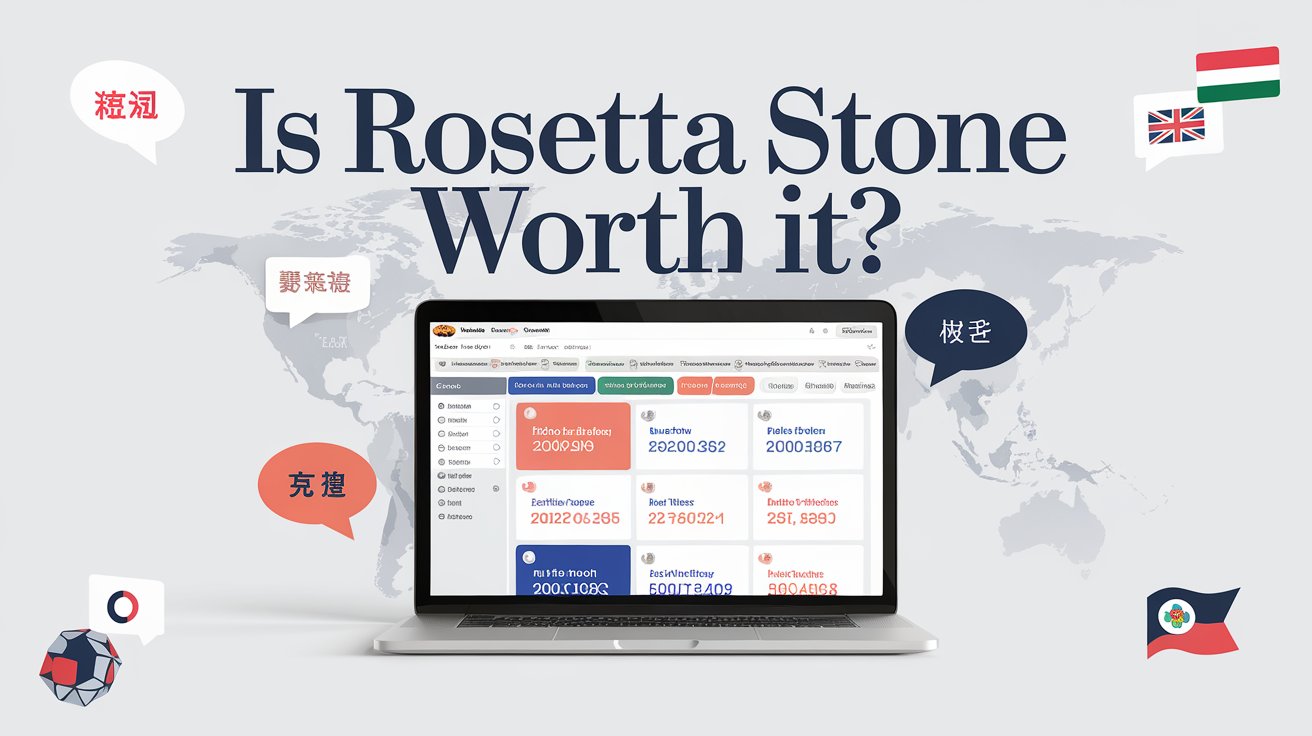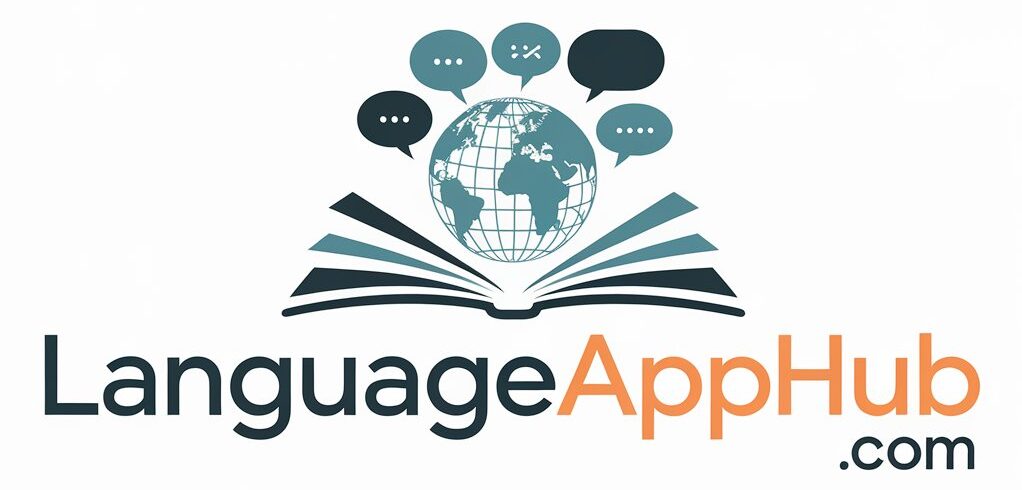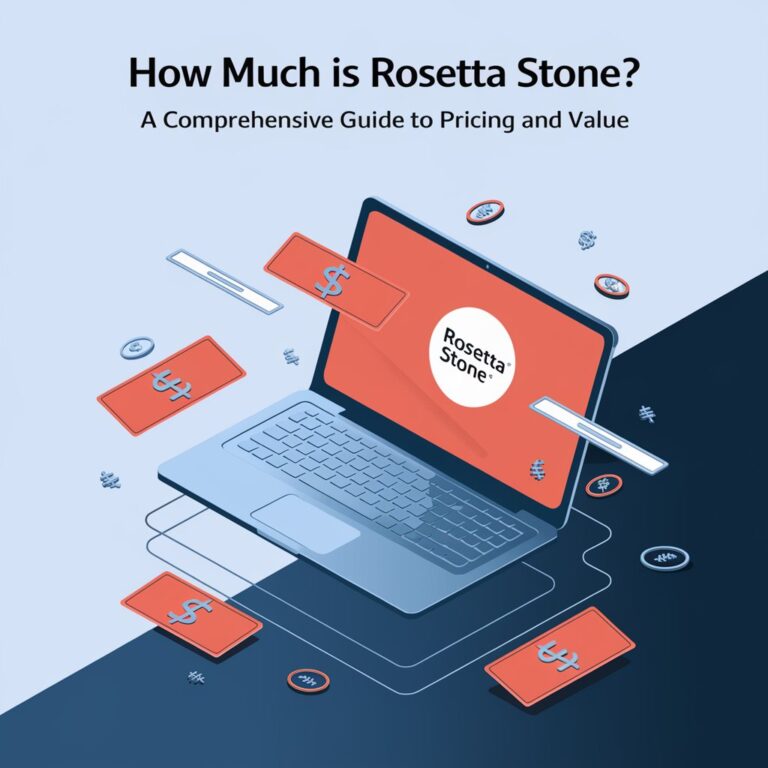Is Rosetta Stone Worth It? A Comprehensive Review in 2024

Thinking about learning a new language? You’ve probably come across Rosetta Stone. This well-known language learning software has been around for decades, but is Rosetta Stone worth it in 2024? Let’s dive into the details and find out if it’s the right choice for your language journey.
What is Rosetta Stone?
Rosetta Stone is a language learning platform that’s been helping people speak new languages since 1992. Named after the ancient artifact that unlocked the secrets of Egyptian hieroglyphs, this software aims to unlock language learning for millions worldwide.
Brief history and background
Arlington, Virginia is where Rosetta Stone’s story began. Allen Stoltzfus, the founder, struggled to learn Russian using traditional methods. This experience sparked an idea: create a system that teaches languages the way kids learn their mother tongue.
Available languages and learning options
Today, Rosetta Stone offers courses in 25 languages, including:
- Spanish
- French
- German
- Italian
- Chinese (Mandarin)
- Japanese
- Arabic
You can access these courses through:
- Web browsers
- Mobile apps (iOS and Android)
- Downloadable software
How Does Rosetta Stone Work?
Rosetta Stone uses a unique approach to language learning. Let’s break it down.
The immersion method explained
The core of Rosetta Stone’s teaching style is immersion. From day one, you’re surrounded by your target language. No translations, no explanations in English. Just pure, unadulterated exposure to the new language.
This method mimics how we learn our first language as children. We see objects, hear their names, and make connections. Rosetta Stone applies this same principle to adult language learners.
Key features and tools
- TruAccent™ speech recognition: This technology listens to your pronunciation and gives feedback.
- Dynamic Immersion®: Associates words with images to help you intuitively grasp meanings.
- Adaptive recall: Reviews concepts at optimal intervals to reinforce learning.
- Stories: Short, interactive stories to improve reading and listening skills.
- Phrasebook: Common phrases for quick reference in real-life situations.
Pricing and Subscription Options
One of the biggest factors in deciding if Rosetta Stone is worth it is the cost. Let’s look at the numbers.
Current pricing structure
As of 2024, Rosetta Stone offers several subscription options:
- 3 months: $35.97 ($11.99/month)
- 12 months: $119.88 ($9.99/month)
- 24 months: $167.76 ($6.99/month)
- Lifetime: $199 (one-time payment)
These prices are often discounted, so keep an eye out for deals.
Comparison with other language learning apps
Compared to other popular language apps:
- Duolingo: Free, with a premium version at $6.99/month
- Babbel: $13.95/month for a monthly subscription, cheaper for longer commitments
- Busuu: $9.99/month for a monthly subscription, with discounts for longer plans
Rosetta Stone sits in the mid-range price-wise. It’s more expensive than some free options but offers more comprehensive features.
Pros of Using Rosetta Stone
Let’s look at what makes Rosetta Stone shine.
Intuitive learning approach
The immersion method can feel natural and engaging. You’re not just memorizing words; you’re discovering a language. This can make learning feel less like work and more like exploration.
High-quality speech recognition technology
TruAccent™ is a standout feature. It helps you nail pronunciation from the start, which is crucial for speaking confidently in real-life situations.
Flexibility and accessibility
With web, desktop, and mobile options, you can learn anytime, anywhere. Waiting for a bus? Squeeze in a quick lesson. On a lunch break? Review some vocab. This flexibility makes it easier to stick to your learning goals.
Cons of Using Rosetta Stone
No language learning tool is perfect. Here are some drawbacks to consider.
Lack of grammar explanations
The immersion approach means you won’t get explicit grammar lessons. For some learners, this can lead to confusion about language rules and structures.
Limited cultural context
While you’ll learn the language, you might miss out on deeper cultural insights. Language and culture are closely tied, and some users find Rosetta Stone lacking in this area.
Potentially repetitive exercises
The core method doesn’t change much as you progress. Some users find the exercises repetitive after a while, which can impact motivation.
Who Should Use Rosetta Stone?
Rosetta Stone isn’t one-size-fits-all. It might be a great fit if you’re:
Beginner to intermediate learners
The immersion method works well for building a foundation in a new language. If you’re starting from scratch or have basic knowledge, Rosetta Stone can help you progress.
Self-motivated language enthusiasts
Success with Rosetta Stone depends largely on your commitment. If you’re self-disciplined and can stick to a routine, you’ll likely see good results.
Business professionals and travelers
The focus on practical vocabulary and pronunciation makes Rosetta Stone useful for work-related language needs and travel situations.
Rosetta Stone for Different Learning Styles
Everyone learns differently. How does Rosetta Stone cater to various learning styles?
Visual learners
The image-based teaching method is perfect for visual learners. Associating words with pictures can help these learners grasp and remember new vocabulary quickly.
Auditory learners
With its emphasis on listening and speaking, Rosetta Stone serves auditory learners well. The speech recognition technology provides immediate feedback, which is crucial for this learning style.
Kinesthetic learners
While not as hands-on as some methods, Rosetta Stone does offer interactive elements. The mobile app, in particular, allows for more tactile engagement with the language.
Comparing Rosetta Stone to Other Language Learning Methods
How does Rosetta Stone stack up against other ways to learn a language?
Traditional classroom learning
Pros of classrooms:
- Direct interaction with a teacher
- Structured curriculum
- Peer practice opportunities
Cons:
- Fixed schedules
- Potentially slow pace
- Higher cost
Rosetta Stone offers more flexibility but less personal interaction.
One-on-one tutoring
Pros of tutoring:
- Personalized attention
- Tailored to your needs and pace
- Cultural insights from native speakers
Cons:
- Expensive
- Dependent on tutor availability
Rosetta Stone is more affordable and always available, but lacks the personal touch of a tutor.
Free language learning apps
Pros of free apps:
- No cost
- Gamified learning
- Community features
Cons:
- Often ad-supported
- May lack depth
- Limited speaking practice
Rosetta Stone offers a more comprehensive approach but at a higher cost.
Real User Experiences and Reviews
What do actual users say about Rosetta Stone?
Success stories
Many users report significant progress, especially in building vocabulary and improving pronunciation. Some have successfully used Rosetta Stone to prepare for travel or work in foreign countries.
Common criticisms
Frequent complaints include:
- Lack of grammar explanations
- Repetitive exercises
- Limited advanced content
It’s clear that while Rosetta Stone works well for many, it’s not the perfect solution for everyone.
Is Rosetta Stone Worth It for Specific Languages?
The value of Rosetta Stone can vary depending on the language you’re learning.
Popular languages (Spanish, French, German)
For widely spoken languages, Rosetta Stone offers comprehensive courses. However, there are also many free or cheaper alternatives for these languages.
Less common languages
For less commonly taught languages, Rosetta Stone can be a valuable resource. The structured approach and speech recognition can be particularly helpful when other learning materials are scarce.
Alternatives to Rosetta Stone
If Rosetta Stone doesn’t seem like the right fit, consider these alternatives:
Other language learning software
- Babbel: More grammar-focused, with real-life dialogue practice
- Pimsleur: Audio-based learning, great for developing listening and speaking skills
- Duolingo: Free, gamified learning with a wide range of languages
Free resources and methods
- Language exchange apps (like HelloTalk or Tandem)
- YouTube channels dedicated to language learning
- Podcasts in your target language
- Free online courses from universities
Tips for Maximizing Your Rosetta Stone Experience
If you decide to give Rosetta Stone a try, here’s how to get the most out of it:
Setting realistic goals
Be clear about what you want to achieve. Set small, achievable goals to maintain motivation.
Incorporating supplementary resources
Use Rosetta Stone as part of a broader learning strategy. Supplement with:
- Grammar books for explicit explanations
- Language exchange partners for real conversation practice
- Movies, TV shows, or podcasts in your target language for cultural context
The Future of Rosetta Stone
What’s next for this long-standing language learning tool?
Recent updates and improvements
Rosetta Stone has been evolving. Recent updates include:
- More interactive stories
- Improved mobile app functionality
- Enhanced speech recognition technology
Potential developments in language learning technology
As AI and machine learning advance, we might see:
- More personalized learning paths
- Virtual reality immersion experiences
- Advanced conversation practice with AI
Final Verdict: Is Rosetta Stone Worth It?
Weighing the pros and cons
Rosetta Stone offers a unique, immersive approach to language learning with high-quality technology. It’s particularly good for beginners and those who learn best through intuition rather than explicit instruction.
However, it’s not cheap, and the lack of grammar explanations and cultural context can be a drawback for some learners.
Making an informed decision
Is Rosetta Stone worth it? The answer depends on your learning style, goals, and budget. If you’re a self-motivated learner who enjoys intuitive learning and can commit to regular practice, Rosetta Stone could be a valuable investment in your language journey.
For those who prefer more traditional methods with explicit grammar instruction or those on a tight budget, other options might be more suitable.
Ultimately, the best language learning method is the one you’ll stick with. If Rosetta Stone’s approach resonates with you and fits your needs, it could be the key to unlocking your language learning potential.
Remember, learning a language is a journey, not a destination. Whether you choose Rosetta Stone or another method, consistency and passion are your best tools for success. Happy learning!

